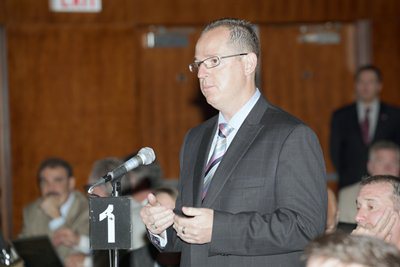Police funerals provide comfort and healing

OPPA President Jim Christie was thrilled to tell his members they could celebrate the New Year with a 8.33% pay hike.
I would like to respond to the letter to the editor published on March 21 entitled, “The case against police funerals.”
— Submitted by
Jim Christie
President, OPP Association
—
When any member of society loses their life at work it is a tragedy. We have never, nor will we ever minimize the death of any worker in any vocation. What differentiates police officers from other workers in the province is that they are often targeted for violent acts.
While it is true that policing does not appear on the “10 Most Dangerous U.S. Jobs” list that Mr. Davies referenced in his letter, we would like to point out that this study was compiled purely on statistics of workers killed per one hundred thousand workers in various fields.
It does not take into account non-fatal injuries police officers sustain on a daily basis and it does not take into account some of the intangibles of policing which cannot be conveyed by statistical data alone. These would include, but are certainly not limited to a traffic stop on the side of the 401 in a snowstorm or entering a residence to execute a search warrant without knowing what is on the other side of the door. Danger lurks around every corner in policing.
Officers losing their lives in senseless and tragic circumstances outrage the citizens of Ontario who, along with officers from across North America, line the streets of their communities to pay respect to our fallen brothers and sisters. Like the members of our community who take time off work or other commitments to attend police funerals, the vast majority of our officers are not paid for their attendance.
When hundreds or even thousands of officers attend a funeral, they do so for a multitude of reasons. The obvious reason is to show respect to a fallen officer and their family. The other common reason our officers continue to attend these funerals is to show support for their communities.
A Police Officer is an integral part of the community that he or she works in. We march to show all our communities that we share in their loss and that we are here for them.
The suggestion that this show of support for our communities “makes a complete mockery of police community relations…” is contrary to the intention of the march and the officers participating within it. It is also contrary to what the public at large says regarding them.
In the face of these tragedies, we continue to see significant support from the public.
People realize it takes a special kind of person to be a police officer. Just as we are there to support our communities, our communities continue to support us in our time of loss. They send emails, tweets, letters of condolences, and line the streets of the largest cities and smallest towns to attend funeral services. No matter how they say it, the message is the same and it is one of thanks and support. For that support we are eternally grateful.
In closing, we would like to extend an invitation to Mr. Davies to do a “Ride Along” with a police officer to see the dangers our members face on a daily basis firsthand. Maybe then Mr. Davies could be in a position to comment on the duties of an officer or how police officers and citizens across the province honour our fallen. He may also want to meet and hear from Ontario Provincial Police widow Heather Pham, Toronto Police Service widow Christine Russell, Ottawa Police Service widow Anna Czapnik or any survivor of a fallen police officer. It may provide a “real life” perspective to a flawed academic’s theory.
– Jim Christie
President
OPP Association















